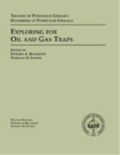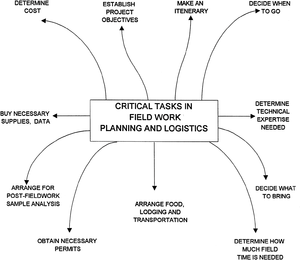Difference between revisions of "Preparing to go to the field"
(Initial import) |
(merged 'Be prepared in) |
||
| Line 14: | Line 14: | ||
| isbn = 0-89181-602-X | | isbn = 0-89181-602-X | ||
}} | }} | ||
| − | + | Planning and logistics are key components for the success of any field party. | |
| + | [[file:value-of-geological-fieldwork_fig19-3.png|thumb|{{figure number|19-3}}]] | ||
| + | |||
| + | ==Be prepared== | ||
| + | Remember the old scouting motto, “Be Prepared.” Know where you are going, identify potential problems, and devise a way to stay in touch with your colleagues in the office. | ||
| + | |||
| + | ===Know the study area=== | ||
| + | Learn the [[basics]] about the local area, including customs, language, and food, if different from your own. In central Africa, laughing is considered a sign of embarrassment; in Saudi Arabia, crossing your legs and exposing the soles of your shoes is considered rude. Read up about the distinguishing cultural traits of the area you will visit. | ||
| − | + | ===Get the necessary permissions=== | |
| + | Obtain the necessary permissions from owners and/or authorities to access land or airspace. It's a good idea to get permissions in writing and carry them with you. | ||
| + | |||
| + | ===Identify potential hazards=== | ||
| + | Identify potential hazards in the field. These include wildlife, hunters, military maneuvers, minefields, and ordinance depots. | ||
| + | |||
| + | Carry first aid equipment and a snake bite kit, and know where to get the nearest medical help. Also be sure you know any specific medical conditions of your team members, such as allergies to food, medicines, or insects. Be sure that all members of the field party have the physical fitness required to do the work. | ||
| + | |||
| + | ===Stay in touch with the office=== | ||
| + | Have a plan for staying in communication with the office while you are in the field. Staying in communication is critical, particularly if the field work is done in a remote, unpopulated area. Periodic contact will allow for status reports, idea sharing, and help in the event of injury or emergency. Also plan for a way that members of the field party can be reached. | ||
==See also== | ==See also== | ||
| − | * [[ | + | * [[Fieldwork checklist]] |
| − | * [[ | + | * [[Planning for a field party]] |
| − | * [[ | + | * [[Some thoughts about geological fieldwork]] |
| − | |||
==External links== | ==External links== | ||
Revision as of 13:36, 22 January 2014
| Exploring for Oil and Gas Traps | |

| |
| Series | Treatise in Petroleum Geology |
|---|---|
| Part | Predicting the occurrence of oil and gas traps |
| Chapter | Value of geological fieldwork |
| Author | Denise M. Stone |
| Link | Web page |
| Store | AAPG Store |
Planning and logistics are key components for the success of any field party.
Be prepared
Remember the old scouting motto, “Be Prepared.” Know where you are going, identify potential problems, and devise a way to stay in touch with your colleagues in the office.
Know the study area
Learn the basics about the local area, including customs, language, and food, if different from your own. In central Africa, laughing is considered a sign of embarrassment; in Saudi Arabia, crossing your legs and exposing the soles of your shoes is considered rude. Read up about the distinguishing cultural traits of the area you will visit.
Get the necessary permissions
Obtain the necessary permissions from owners and/or authorities to access land or airspace. It's a good idea to get permissions in writing and carry them with you.
Identify potential hazards
Identify potential hazards in the field. These include wildlife, hunters, military maneuvers, minefields, and ordinance depots.
Carry first aid equipment and a snake bite kit, and know where to get the nearest medical help. Also be sure you know any specific medical conditions of your team members, such as allergies to food, medicines, or insects. Be sure that all members of the field party have the physical fitness required to do the work.
Stay in touch with the office
Have a plan for staying in communication with the office while you are in the field. Staying in communication is critical, particularly if the field work is done in a remote, unpopulated area. Periodic contact will allow for status reports, idea sharing, and help in the event of injury or emergency. Also plan for a way that members of the field party can be reached.
